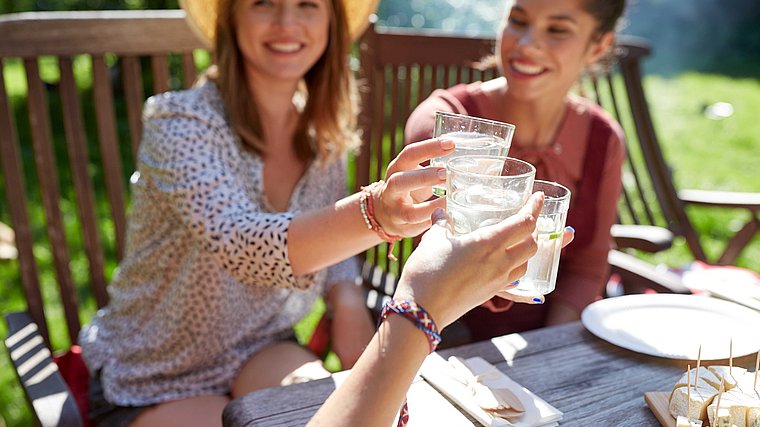Can you imagine celebrating an important occasion without the usual glass of wine or other alcohol? There are many people who can’t. Alcohol has been part of our history and culture and a permanent feature of gatherings with friends or celebrations since the early days of humanity. According to WHO statistics from 2018, the global average consumption of pure alcohol per person above 15 years of age per year is 6.4 litres. An average Pole consumes almost twice that amount, 11.6 litres of pure alcohol annually. Interestingly, as a nation, we tend to prefer beer (56%). Is it a good choice? Let’s see.
Does alcohol cause weight gain?
Every product which, when consumed, delivers more kilocalories to our bodies than what we need, will result in weight gain. Because of the calorie content in alcoholic beverages (7 kcal per 1 g) and calorie-rich snacks that tend to accompany the drinks, ‘booze’ consumed regularly may put too much flesh on your bones. Obviously, every alcohol-containing beverage has a different ethanol content, and thus calorie content. So which one is the least fattening?
- BEER – the average calorie content in this beverage is 250-300 kcal/500 ml, making it the most ‘attractive’ option in comparison to the other alcohols below (50-60 kcal per 100 ml). However, it is often accompanied by savoury snacks, such as crisps, peanuts, salty sticks, that may deliver another 500 kcal to your body. So it’s a good idea to avoid them. Another thing speaking in favour of beer is that it can be sipped without any additional beverages (usually sweet soft drinks). The downside is the content of sugar in the form of barley malt. Beer is one of the most insulinogenic beverages. When consumed, it triggers a sudden rise in blood glucose that spikes insulin.
- VODKA – a single shot (50 ml) contains about 140 calories. You also need to allow at least 40-50 kcal per every 100 ml of a mixer. Unfortunately, because of all these additions like sugar syrup, juice, other spirits or coconut milk, the calorie content of cocktails can be hard to estimate. In many cases it will be very high, perhaps as high as that of a regular meal.
- WINE – one glass of wine (120 ml) contains almost 100 calories. Wine itself has a small amount of nutrients, especially the red variety. It may contain antioxidants, potassium, magnesium and calcium. We keep hearing about its beneficial effect on the blood system because of the flavonoids it contains. However, this amount is too small to cause any positive effects in your body. Moreover, wine contains alcohol, which itself has an adverse health effect.

Demanding metabolism
Shortly after you take the first sips of alcohol, your body starts to metabolise it by absorbing, transforming and eliminating. In the first step of the process, the small intestine takes over, absorbing as much as 80% of the alcohol, while the remaining 20% is absorbed through the stomach wall. It is then transported with the blood throughout your body.
As it can’t be stored, your organism gets rid of it all, mainly through the liver, which decomposes the substances to the simplest form. This is where as much as 90% of the accumulated alcohol is metabolised and eliminated.
The ethyl alcohol contained in alcoholic drinks is a poison, and therefore your body will want to cleanse as soon as possible, focusing on detoxication processes at the expense of digesting and absorbing other ingredients. It is also noteworthy that alcohol dehydrates you, affecting many processes in your body, since most of them take place in a water environment.
Irrational food choices
The consequences of drinking alcohol additionally depend on timing – the evening will be your worst option. While spirits may help you fall asleep, they do affect sleep quality. Analysis has shown that after having ‘booze’, we often wake up in the second stage of sleep, and the night’s rest tends to be shorter.
The result? You can be almost sure you won’t be well rested, but that’s the least of your worries. Sleep deficiency affects the carbohydrate metabolism, increasing fasting blood glucose and intensifying the secretion of ghrelin, the hunger hormone. That’s why night owls and late alcohol drinkers find it very difficult to make reasonable food choices the day after. It’s harder for them to fill up, they often grab high-calorie foods and they eat much more than usual. This does not help lose weight – according to studies, a day after consuming alcohol we eat up to 500 kcal more without even knowing.
The AgRP neuron plays a role here. As scientists from London have discovered, it is activated by ethyl alcohol delivered to your body. Aside from aggravating hunger, it slows down the metabolism. Further to that, the activation of AgRP blocks POMC neurons which usually help your body determine if the amount of kilocalories you have consumed is sufficient to satisfy its demand.
Drink sensibly
Pythagoras, the Greek philosopher, said that everything must be done in moderation. We agree with him. Occasional consumption of alcohol should not have any adverse effects on your health or disturb the weight loss process. It is, however, important, what and how much you drink. Consuming alcohol should not serve as an excuse to give up on healthy eating or the target calorie deficit. If you get back on track with your diet the day after, the ‘booze’ will not jeopardize your body goal.
Literature:
- “Global status report on alcohol and health 2018”, WHO, 2018
- Jakubczyk A., Wojnar J., Wojnar M. et al.: Zaburzenia snu u osób uzależnionych od alkoholu. Alkoholizm i Narkomania 2009, Vol 22: No. 2, 143159
- Jarosz M., Rychlik E., Stoś K., Charzewska J. (eds.): Normy żywienia dla populacji Polski i ich zastosowanie. Narodowy Instytut Zdrowia Publicznego – Państwowy Zakład Higieny, 2020
- Cains, S., Blomeley, C., Kollo, M. et al. Agrp neuron activity is required for alcohol-induced overeating. Nat Commun 8, 14014 (2017). https://doi.org/10.1038/ncomms14014
